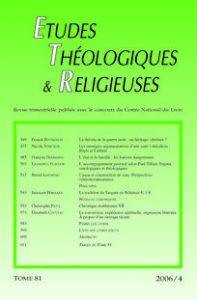Nicola Stricker distingue ici deux stratégies argumentatives dans les théodicées négation ou limitation de la puissance divine, et subordination de sa bonté et retrace leurs arguments principaux tels qu’ils sont présentés et remis en question par Bayle, à qui Leibniz opposera sa « Théodicée ». Elle montre que Leibniz se sert surtout de la seconde stratégie de justification en utilisant le topos du mundus optimus, tandis que l’aveu d’incompréhension, avancé par Bayle, correspond à une troisième stratégie de justification, la mise à l’abri des attributs de Dieu par la déconstruction de toute approche rationnelle.
Nicola Stricker examines two argumentative strategies in theodicy : negation or limitation of the Divine Power on the one hand and subordiantion of His Goodness on the other. Going over the main arguments as they are presented and questioned by Bayle, she shows that Leibniz – who opposed Bayle his own « Theodicy » – favours the second strategy by using the topos of mundus optimus, whereas Bayle’s acknowledged incomprehension displays a third strategy of justification that protects God’s attributes by destruction any rational approach.
p. 475-484
Auteur
STRICKER Nicola
Nicola STRICKER est professeure associée à l'Institut protestant de théologie/fonds Ricœur et directrice de l'Association des étudiants protestant (ESG) à Düsseldorf.
